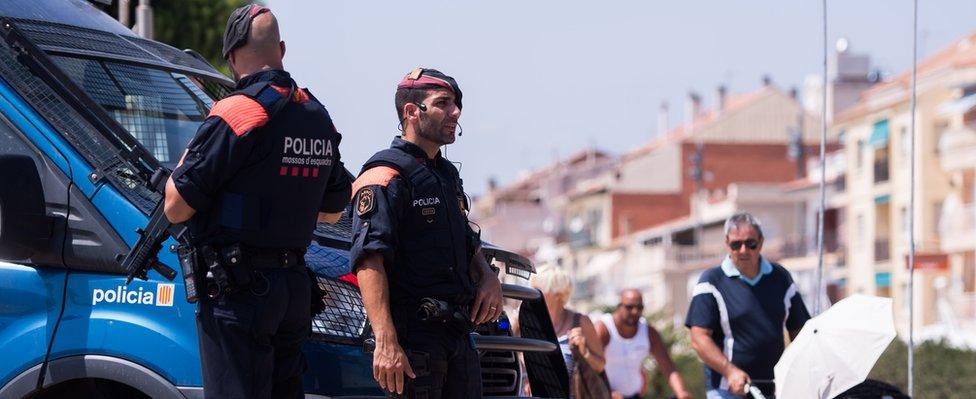Barcelona and Cambrils attacks: 'I'm not afraid'
- Published
King Felipe VI joined an estimated 100,000 people for a minute's silence in Barcelona
Spanish cities joined together in silence on Friday for the victims of the truck attack on Barcelona's Las Ramblas. But when the minute's tribute ended in the city's Plaça de Catalunya, the chants began in Catalan of "No tinc por" - I'm not afraid.
After the silence came a ripple of applause, and then spontaneously the shouts of defiance spread around the crowd of tens of thousands in the square and in the streets around it.
Allow X content?
This article contains content provided by X. We ask for your permission before anything is loaded, as they may be using cookies and other technologies. You may want to read X’s cookie policy, external and privacy policy, external before accepting. To view this content choose ‘accept and continue’.
At the front of the crowd stood King Felipe VI, Prime Minister Mariano Rajoy and Catalan President Carles Puigdemont. It was a rare moment of unity for a prime minister and a Catalan leader at loggerheads over a planned 1 October secession vote.
And the sentiment resonated across Spain and beyond.
Almost every Catalan will have understood No tinc por and its plural No tenim por - we are not afraid. For most Spaniards the words themselves mean nothing.
Barcelona doctor Arturo Huerta was among the first to tweet the phrase, adding its translation in Spanish "No tengo miedo", as well as English, French and German. "Strength in unity," he added.
Allow X content?
This article contains content provided by X. We ask for your permission before anything is loaded, as they may be using cookies and other technologies. You may want to read X’s cookie policy, external and privacy policy, external before accepting. To view this content choose ‘accept and continue’.
The design of a four-petalled flower is an important symbol for Barcelona. Paving stones with the "flower of Barcelona" motif are everywhere in the city.
By Friday afternoon over 12,000 people had used the Catalan hashtags NoTincPor and NoTenimPor, including Carles Puigdemont and Barcelona's mayor, Ada Colau. The Catalan government tweeted: "The people of Barcelona's answer has been immense and impressive. This is the defeat of terrorism, the spontaneous cry of 'I am not afraid'."
Allow X content?
This article contains content provided by X. We ask for your permission before anything is loaded, as they may be using cookies and other technologies. You may want to read X’s cookie policy, external and privacy policy, external before accepting. To view this content choose ‘accept and continue’.
That show of unity has been matched by Spain's national political class.
Socialist opposition leader Pedro Sanchez, who took part in the silence in Barcelona tweeted in Spanish as well as Catalan: "We are not afraid".
Allow X content?
This article contains content provided by X. We ask for your permission before anything is loaded, as they may be using cookies and other technologies. You may want to read X’s cookie policy, external and privacy policy, external before accepting. To view this content choose ‘accept and continue’.
For now the mood in Barcelona and Spain more widely is one of unity and defiance. But the background noise until now in Barcelona and the national capital, Madrid, has been anything but.
Have Spanish police passed on intelligence?
One controversy involves the key question over how intelligence and police in Madrid have shared information with their counterparts in Barcelona.
The task of responding to the Barcelona and Cambrils attacks has fallen to the Catalan police force, the Mossos d'Esquadra.
For decades it has been under the authority of the Catalan government and there have been complaints that the national government has failed to share information with the Mossos and failed to respond to calls for hundreds more officers.

Catalan police, known as the Mossos, have run the security response to the Barcelona and Cambrils attacks
For years the Catalan force has asked Madrid to incorporate it into its anti-terrorism and crime intelligence centre (Citco) as well as the EU's Europol law enforcement agency and its databases.
An agreement from Madrid finally came last month on incorporating the Mossos into Spain's intelligence centre. Discussions are still going on over its future involvement in Europol.
If, as reported, the CIA did hand Spain intelligence about an attack, would have it have been passed on to Barcelona?
'Political opportunism'
And then there is the row over the Catalan government's plan to push ahead with independence 48 hours after a secession vote on 1 October.
The national government sees the vote as illegal and unconstitutional.
For now the secession row has been kept relatively quiet. But there are rumblings.
National newspaper El País said, in an editorial on Friday,, external that the Barcelona attack "had to jolt the Catalan political forces back to reality". It was time to end the "democratic nonsense" and "political opportunism" and work for the real interests of their citizens.
It was an uncompromising note amid all the voices of unity.